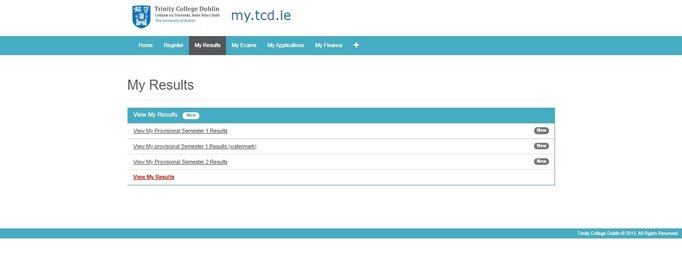It’s widely-acknowledged that Trinity’s release of Michaelmas provisional results last year was a disaster. Most students were refused access to their Christmas results report when the mytcd site crashing as a result of “too much activity.” Many students experienced a delay of over 24 hours in receiving their results, and criticised Academic Registry for the stressful and inefficient system. This year, however, students were informed in an email that provisional results would be released on a new “phased basis by faculty” system, whereby the faculties of Health Sciences (HS), Engineering, Mathematics and Sciences (EMS) and Arts, Humanities and Social Sciences (AHSS) released their grades on three separate days. According to many students, this new tiered system seems to have worked well for most departments.
“For those who were eager to access their results, this inefficient system was a source of great stress and anxiety…”
The problems with last year’s system were clearly a result of too many people trying to access the site at once. On results day, many students were in the Arts Block and the library with their laptops in hand, refreshing the mytcd site over and over again to no avail. A few students were able to access their results at home, leading some to believe that Trinity’s wifi system was part of the problem. For those who were eager to access their results, this inefficient system was a source of great stress and anxiety, as they continued to wait to see if they achieved the mark they had hoped for or needed.
After working hard all semester and coming back to college after a long break, receiving results can be an anxious time and can have an impact on a student’s attitude entering a new semester. January and February can also be a time where students begin to think of summer plans, which for some depends largely on receiving their results. Application deadlines for internships and deposits for J1s are expected at that time of year, and finding out whether or not you may have to reserve time for supplemental exams is another extremely stressful aspect of the results period. Thankfully, the frustration experienced by many students was acknowledged by Trinity’s administration, who changed to the new system in the hope of reducing stress for students anticipating their results.
“Perhaps EMS programmes are still too large of a number to access results all within the same day, and should be split up.”
This year, as a third year student I was one of those eager to access their results, and hoping that the new “phased” system would mean that I would get them on time. Mercifully this time around, it seemed that results were accessed with ease, specifically in the Arts and Humanities department. EMS, however, did experience lagging, but just by a few hours and nothing compared to last year’s difficulties. This lagging seemed to be due to the same situation as last year, namely, the site crashing because of too much activity at once. Perhaps EMS programmes are still too large of a number to access results all within the same day, and should be split up.
In other colleges like UCD, the system for receiving results is similar to Trinity’s previous flawed system. According to a UCD student, delays were also experienced when trying to access results online, however the college is also taking up a “phasing” approach. However, in UCD’s system, students receive results based on randomised groups of students receiving notifications by email rather than faculty.
Although results are not the be all and end all of a college experience, they can have a significant impact on stress and anxiety in a student’s life. Ensuring that a simple and problem-free system of accessing results is in place can help in preventing any additional frustration and anxiety for students during this time. Overall, this year’s tiered system seems to have worked generally pretty well. It seems to be a better and more efficient system than previously, and caused less stress to most students who could access their results with ease either in college or at home.






